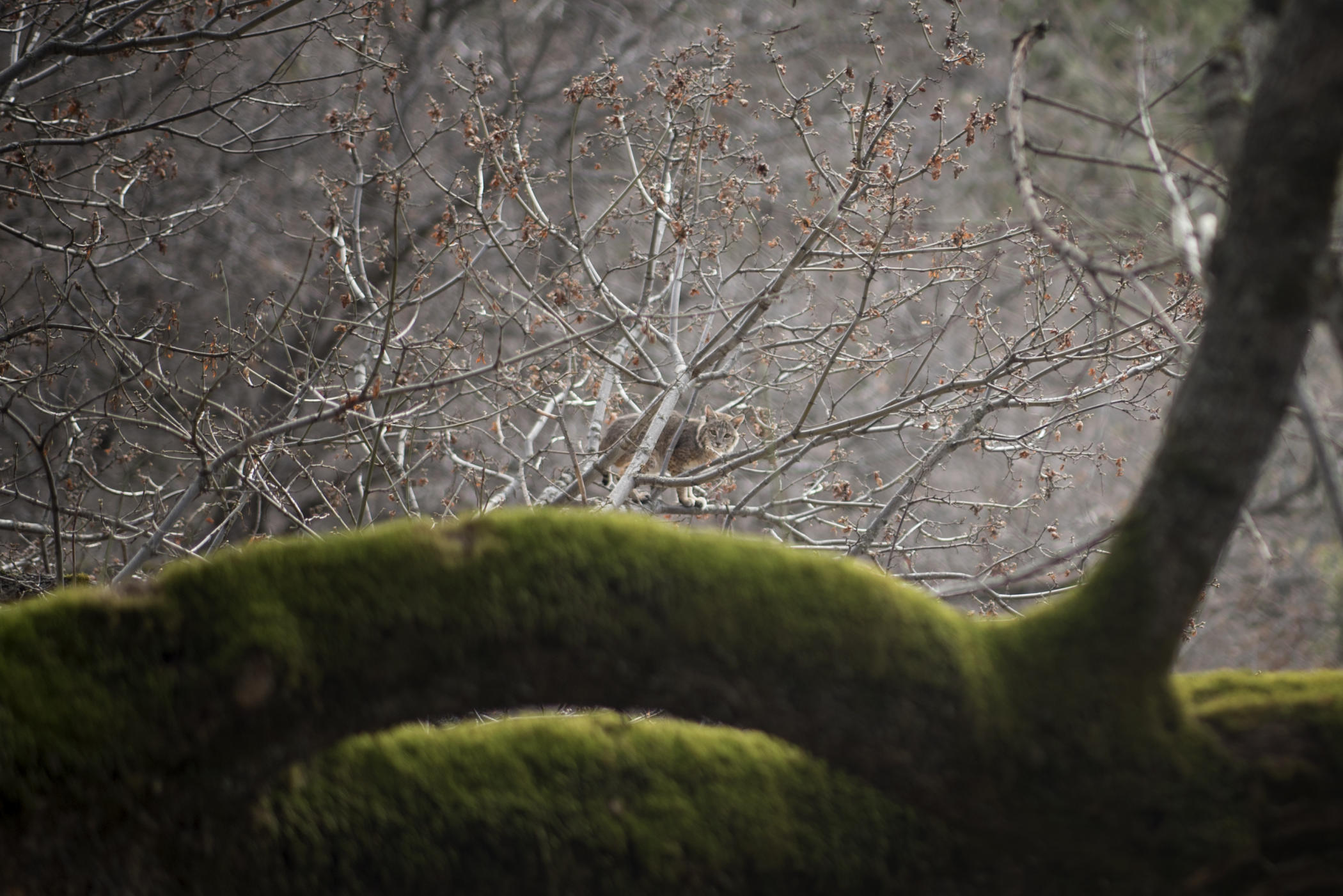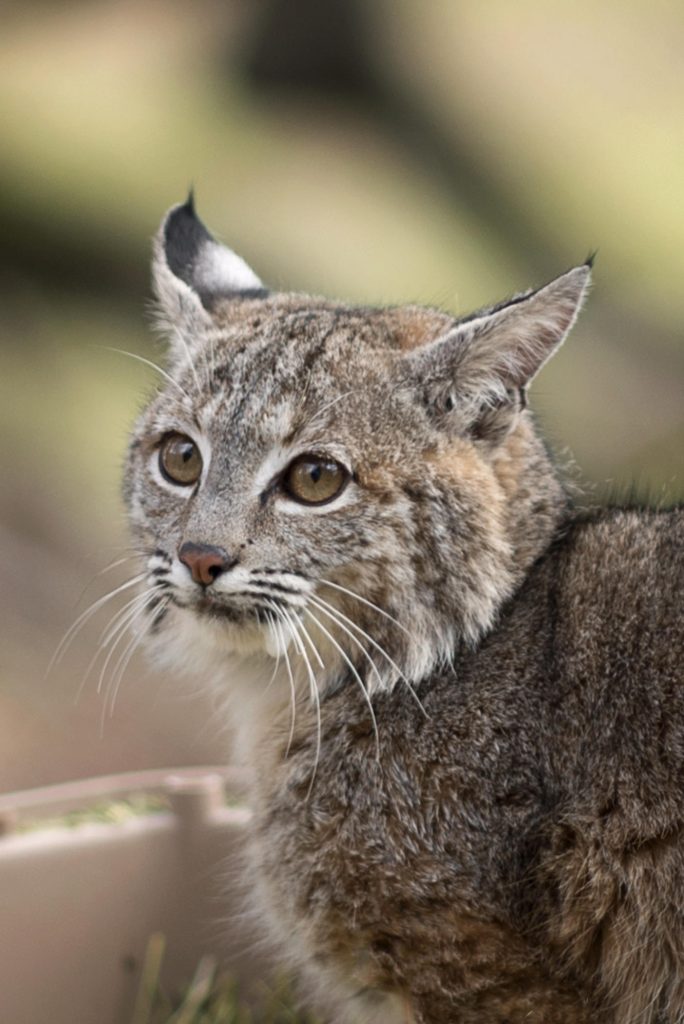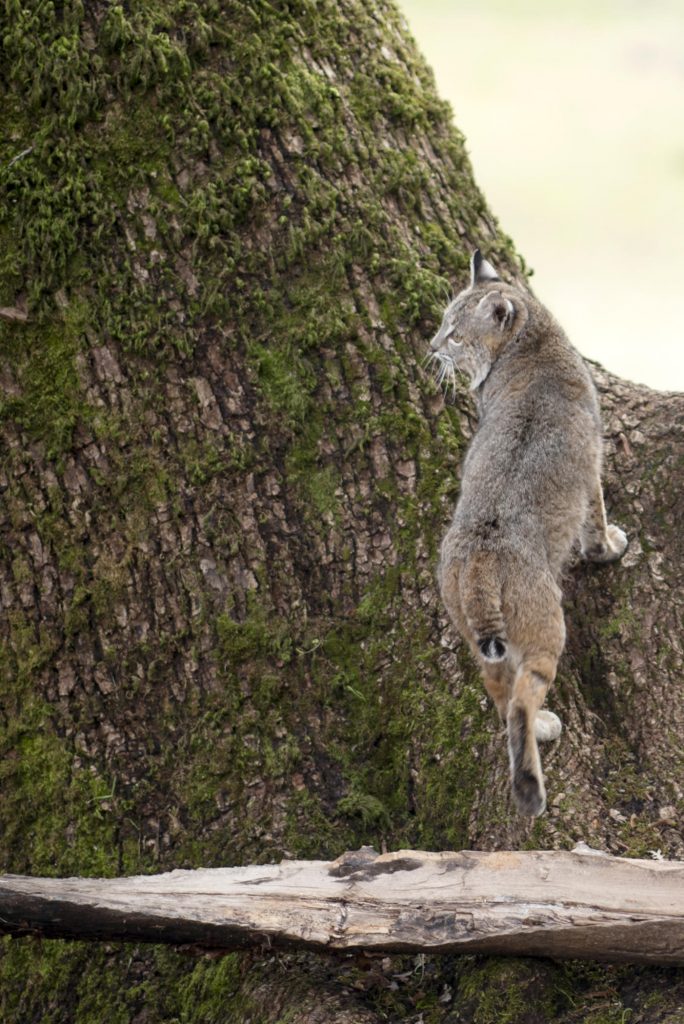Wildcat Returns to Wild

Big Chico Creek Ecological Reserves (BCCER) partners with the CA Department of Fish & Wildlife to release a rehabbed bobcat at BCCER on Sunday, February 10, 2019, in Chico, Calif. The bobcat had the bottoms of its feet burned off during the Camp Fire and has been getting treated and rehabbed over the past two months. (Jessica Bartlett/University Photographer/CSU Chico)
A bit cranky from the morning chaos of being captured and transported 100 miles, the captive let rumble a few guttural growls as he rattled his plastic crate.
“He’s raring to go,” said Eli Goodsell, manager of the Big Chico Creek Ecological Reserve (BCCER). “He’s like, ‘Yes, I do want to live here, let me out!’”
It was a joyous occasion all around this week, as a once-badly burned bobcat returned to the wild, 2 ½ months after sustaining severe injuries to its paws in the Camp Fire last November. Rehabilitated at Gold Country Wildlife Rescue in Auburn with support from UC Davis Veterinary Medical Teaching Hospital, he healed quickly and his return to Butte County came months earlier than expected. The BCCER was chosen for his new home because the 3,950 acres managed by the CSU, Chico Research Foundation shares a similar ecosystem with where the fire burned.
As the Gold Country Wildlife volunteers clipped off the plastic ties holding the crate together and lifted away the lid, voices grew hushed and camera shutters began rapidly clicking. The bobcat looked warily at his captors-turned-releasers and, with a few sideways glances to reserve staff and media, he stepped backward cautiously out of the crate.

After a few furtive glances, he scampered up the nearby trunk of the largest broad-leaf maple on the reserve. He clambered over its mossy bark and bounded limb to limb, putting as much distance between the humans and himself as he possibly could.
“You never believe it’s going to happen and you want it so bad,” said Gold Country founder and board member Sallysue Stein (Computer Science, ’76), tears forming in her eyes. “What a perfect spot.”
“I’m not crying because I’m sad or crying because I want to keep him,” she continued. “We see this animal come in in such critical condition, and you wonder, ‘Are they going to survive and be able to be released?’ It’s why we do it. It’s as simple as that.”
When the bobcat was brought to Valley Oak Veterinary Center in Chico on November 28, he had fifth-degree burns on all four paws, with damage reaching all the way to the bone. Three weeks after the fire, the feline was also emaciated, weighing only about 6 pounds, his fighting spirit the only thing holding him on the brink of life.
Valley Oak called Bidwell Wildlife Rescue, which had to make a referral to nearby partner Gold Country Wildlife Rescue because of its own losses in the fire. There, Stein partnered with UC Davis veterinarian Jamie Peyton, who used the emerging medical procedure of adhering tilapia skin to heal the burnt flesh. He was also treated with cold laser therapy, post-electromagnetic therapy, and acupuncture.
“You have to attack pain from every possible source so they can heal,” Stein explained.
Stein began working in wildlife rescue in the early 1980s, just a few years after graduating from Chico State. She founded Gold Country Wildlife Rescue in 1991 and it’s been her life’s work ever since. Each year the nonprofit helps thousands of injured birds and wildlife return to their natural environment. She estimates she has rehabilitated a few hundred bobcats in the last three decades.
“If we don’t rehabilitate them today, they don’t have a tomorrow,” she said. “We have to protect them. We are the only hope they have.”
Rules are strict at the wildlife center—no cuddling or talking to the animals to ensure they don’t develop any affection toward humans or any other behaviors that could prevent their eventual release. All contact is kept as minimal as possible to reduce stress on the animals, and they are paired with others of their species whenever possible.

With a robust diet of frozen pheasants and mice in captivity, the Camp Fire bobcat recovered to about 15 pounds by the time of his release. He was as feisty as ever the morning of his release, snarling and swiping at his rescuers as they tried to nudge him into his transportation crate.
His zeal for life, Stein said, was the last piece of proof he was ready for release.
After a few minutes of watching him nestle into his spot in the oak tree, the volunteers decided it was time to let him embrace his newfound freedom in private. They left him a picnic lunch of frozen birds and rodents at the base of the tree for when he finally felt comfortable to climb down, and they returned to the reserve office, still marveling at the perfection of his new home.
With trees to climb and brush for cover, Goodsell (Criminal Justice, ’07; MA, Geography, ’11) said he expects the bobcat will live out a happy life at the reserve. After nearly 500 goats and a recent prescribed burn had passed through the area, the absence of dead duff or grass makes it prime habitat for hunting the birds, rodents, and squirrels.
“Anything we can do in the wake of the Camp Fire to support our communities, we want to take full advantage of,” said Goodsell, who grew up in Paradise and attended Paradise High School before coming to Chico State. “If we can bring an animal that was affected to an area where it can thrive, we want to.”
Furthermore, the bobcat’s release directly supports the reserve’s mission of habitat conservation, restoration, and education, Goodsell said.
“We’ve been managing wildlife for species diversification, research, and preservation for years, so offering the reserve as a new home for this bobcat in need just made sense.”
California Department of Fish and Wildlife biologist Henry Lomeli said the state agency has released animals at the reserve for years and he was happy to be a partner in this reintroduction.
“It’s close to Bidwell Park but it’s also more secluded. There are lots of birds and small rodents, and it’s a great wildlife location. Why not put Chico State’s wildcat there?” he said. “And who doesn’t like to have a happy ending to a rough start?”
Gold Country expects to return to the reserve later this semester to release two foxes that also suffered burns in the Camp Fire.
The Sacramento Bee produced a short video showcasing the bobcat’s release.


